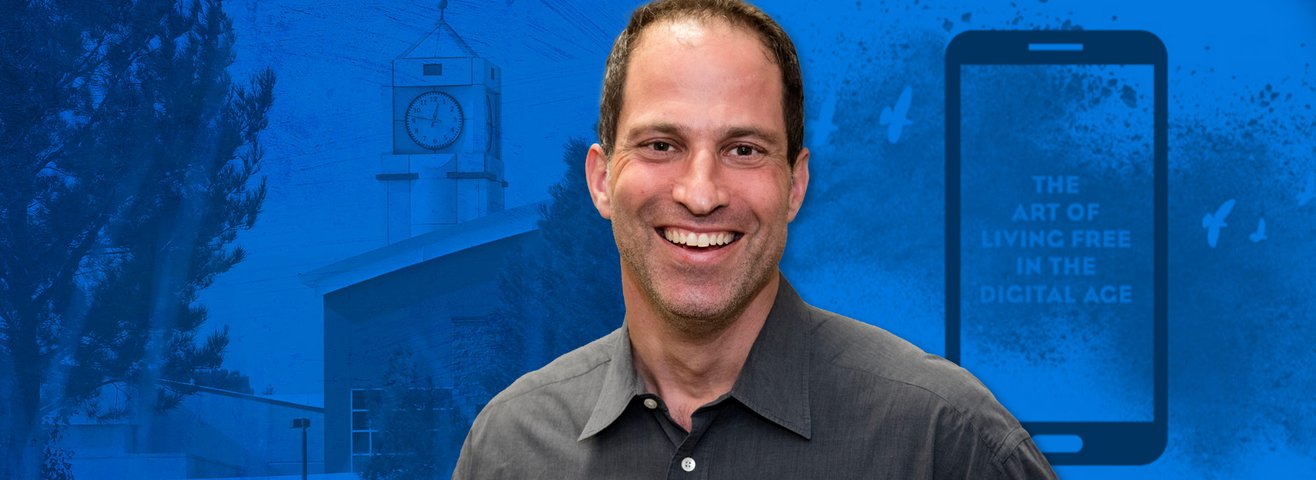
CSUSB associate professor blogs on dealing with effects of pandemic
The Art of Living Free
addresses how we can make a meaningful connection with ourselves and others, and create personal and social change,” said Silard, who joined the CSUSB Jack H. Brown College of Business and Public Administration in 2016. The blog appears in Psychology Today
and is available every week or two at www.theartoflivingfree.org
.
Silard chose writing a blog because “It is a way to reach people quickly and directly.”
“I spent 10 years researching and writing my latest book, ‘Screened In: The Art of Living Free in the Digital Age
,’ which deals with how technology is affecting us and our relationships, and what we can do about it,” Silard said.
He has written more than 30 blogs, all since March, each addressing how to cope with the certain issues that are a result of dealing with the mental and emotional effects of the pandemic.
Silard said the blog, “
How to Be Lonely Without Becoming Depressed: Understand the critical difference between loneliness and depression
,” has garnered the most attention and comments.
“While I’d like to give credit to my writing abilities, this article has reached such a large audience because of the topic,” Silard said. “Over 3 in 5 Americans were lonely before the pandemic. Both loneliness and depression have become the new norm. That needs to change.”
In the blog, Silard talks about recognizing that both loneliness and depression are emotions and quotes Dutch philosopher Baruch Spinoza that “Emotion, which is suffering, ceases to be suffering as soon as we form a clear and precise picture of it.”
“If we can better understand each of these emotions, we are less likely to suffer from them,” Silard writes.
Silard offers a number of suggestions on how to cope, including how to avoid disconnection and how to transform loneliness into solitude and social engagement.
The key for Silard is to not only recognize the problem, but also offer ways to deal with it.
Along with the readers of his blog, Silard uses it in the classroom because his students face the same dilemmas that readers of his blog face.
“I write my blog articles with the people I come across from day to day in mind. These are my friends, conference participants and students, mostly,” Silard said. “I often ask students to read one of my blog articles in Psychology Today and come to class ready to discuss it. Many students have shared that they like this contemporary dimension to my courses; they like to feel they are discussing something that is currently affecting them and matters in their lives.”
Silard’s dedication in the classroom and in the community has been recognized.
Earlier this year, Silard was named the recipient of the CSUSB Office of Community Engagement’s 2020 Outstanding Community Engagement Award
. He was recognized for his innovative and engaged academic work; his history of community collaboration and change, especially in the development of youth leaders; and his role in raising the university as an institution committed to the development of a stronger and more engaged civic society through the nonprofit management education program.
Silard has also reached out into the community in numerous ways, including: facilitating trainings for over 200 Inland Empire nonprofit organizations; working with more than 200 low-income families who have lost a child affiliated with the Unforgettables Foundation; and working with more than 150 low-income youth affiliated with the Community Foundation and Court Appointed Special Advocates (CASA) of San Bernardino.
In addition, Silard has partnered with community organizations in Washington D.C. to provide (pro-bono) the “Young Leaders” summer program for high school students on developing leadership skills to pursue their goals and to secure meaningful careers.
Silard is also president of the nonprofit Center for Social Leadership
, whose mission is to build the leadership and managerial capacity of nonprofit organizations and to teach low-income youth the necessary career-building leadership skills to design their own exit strategies from poverty.


